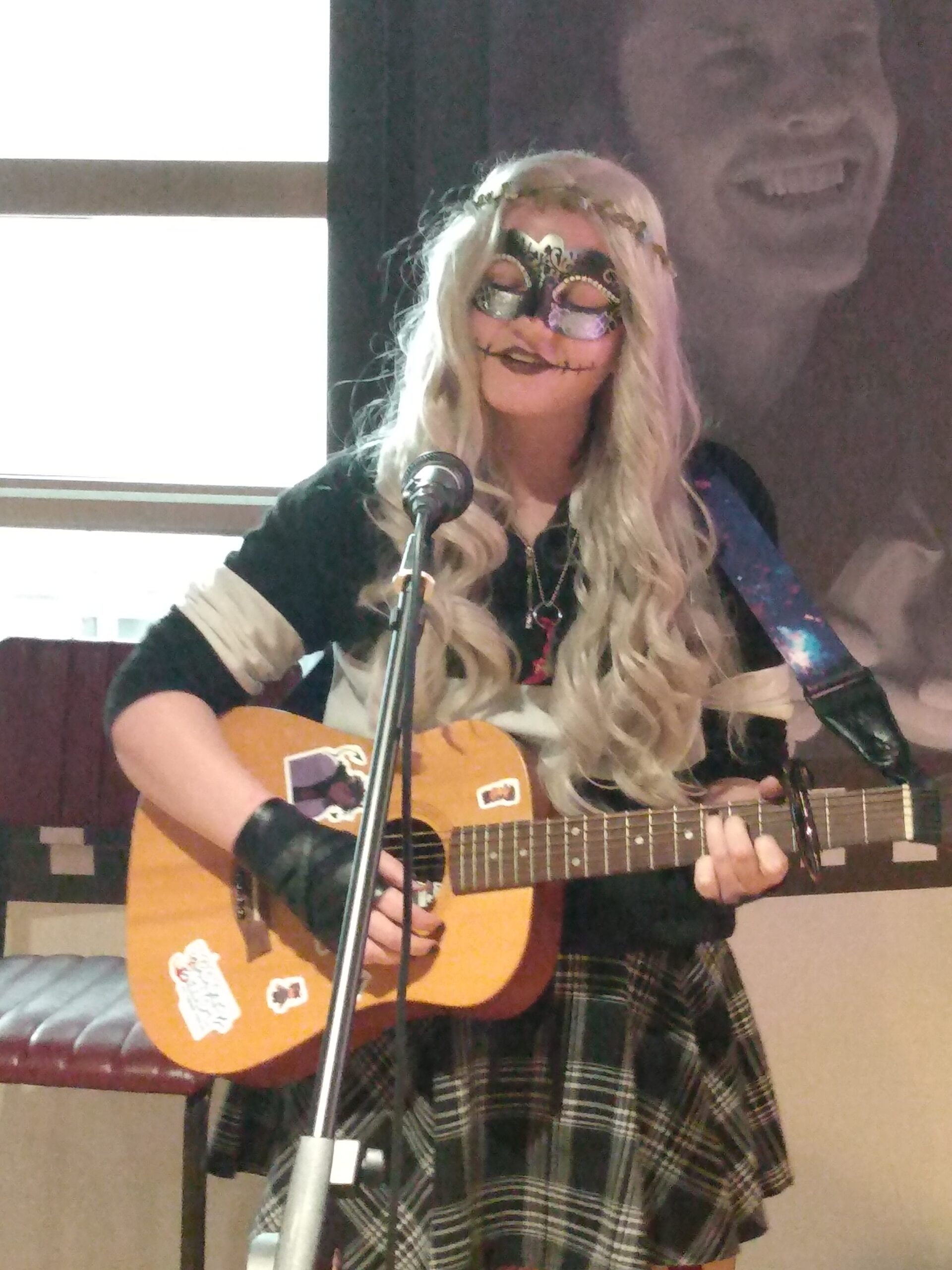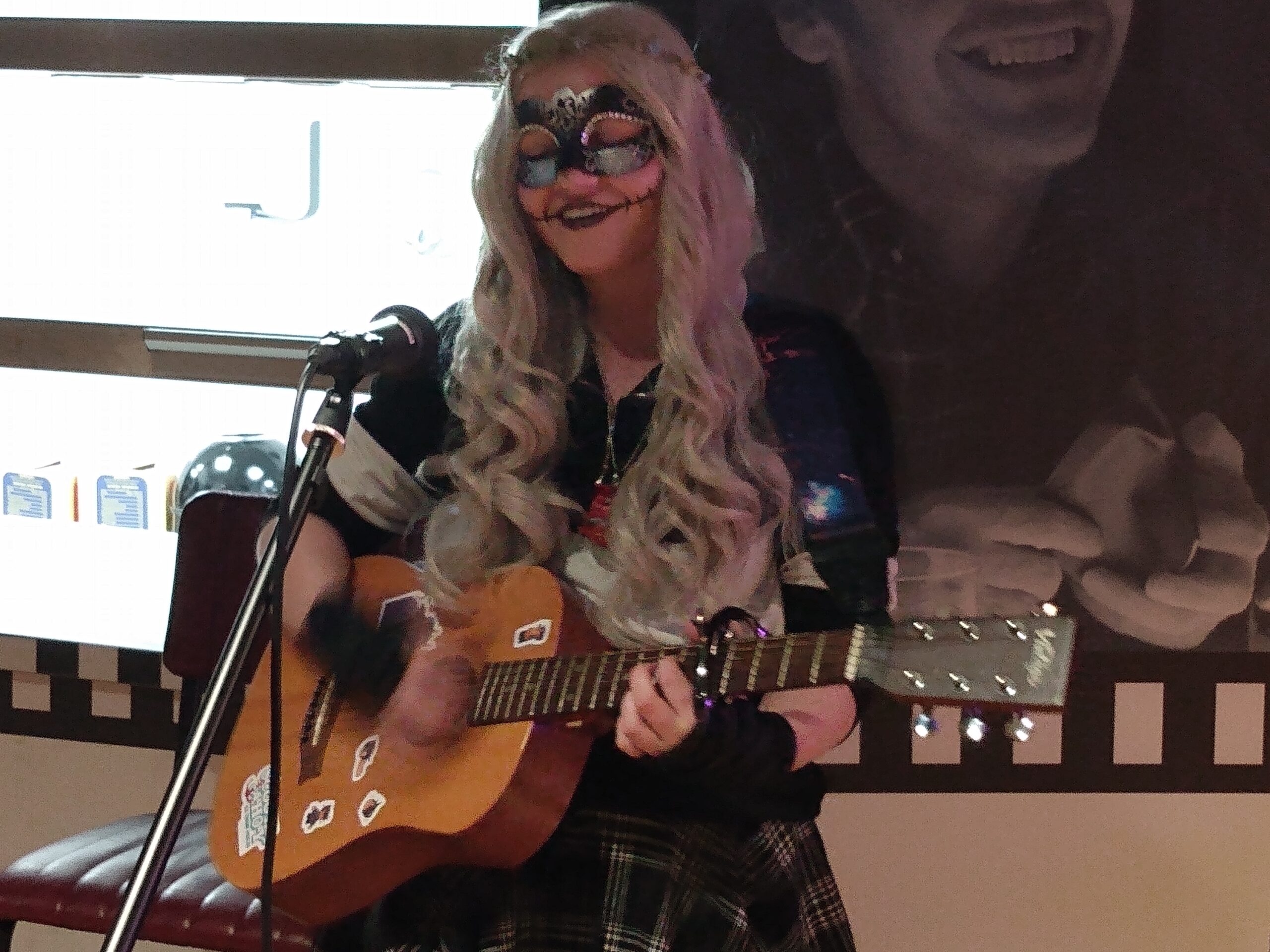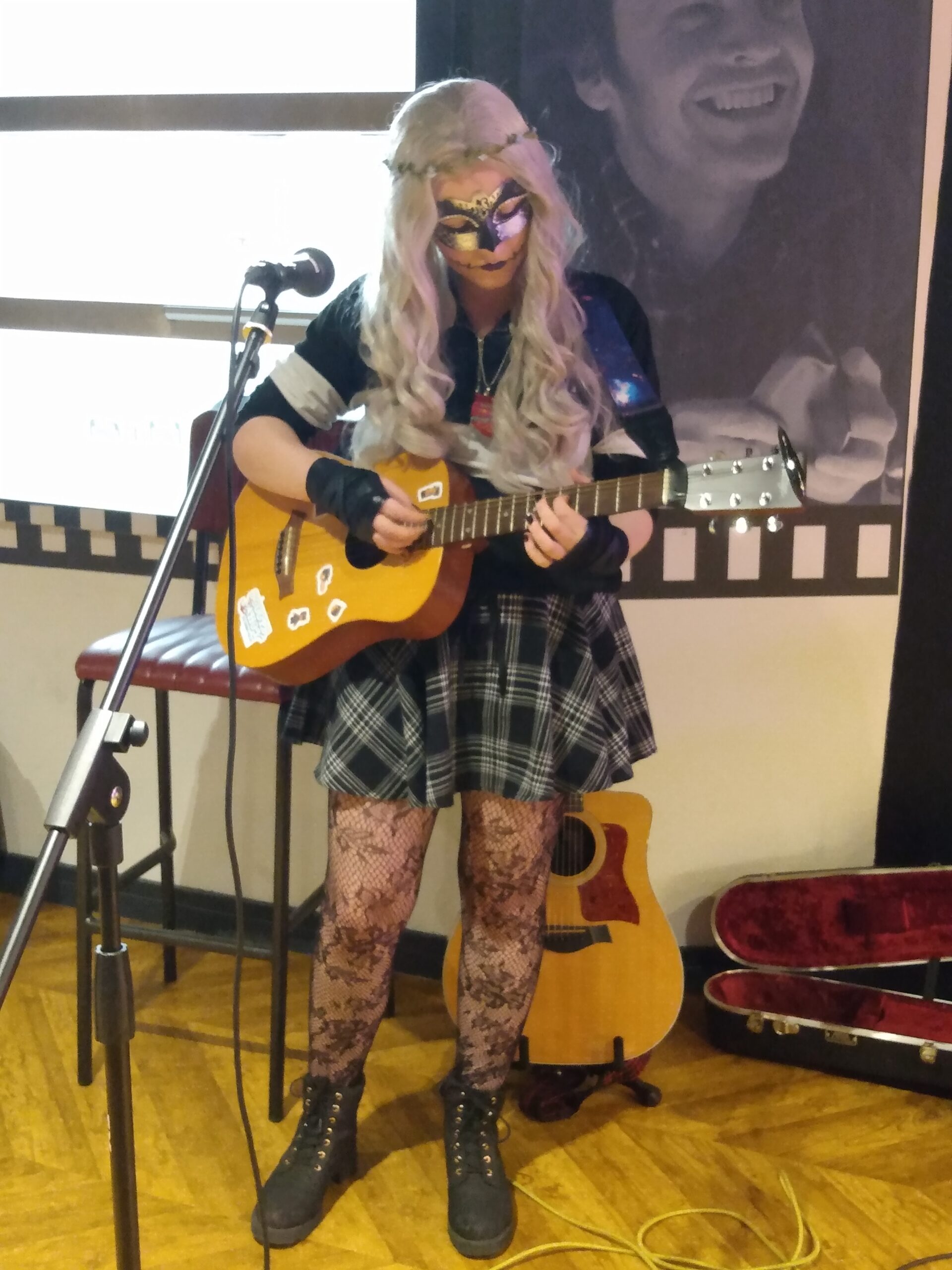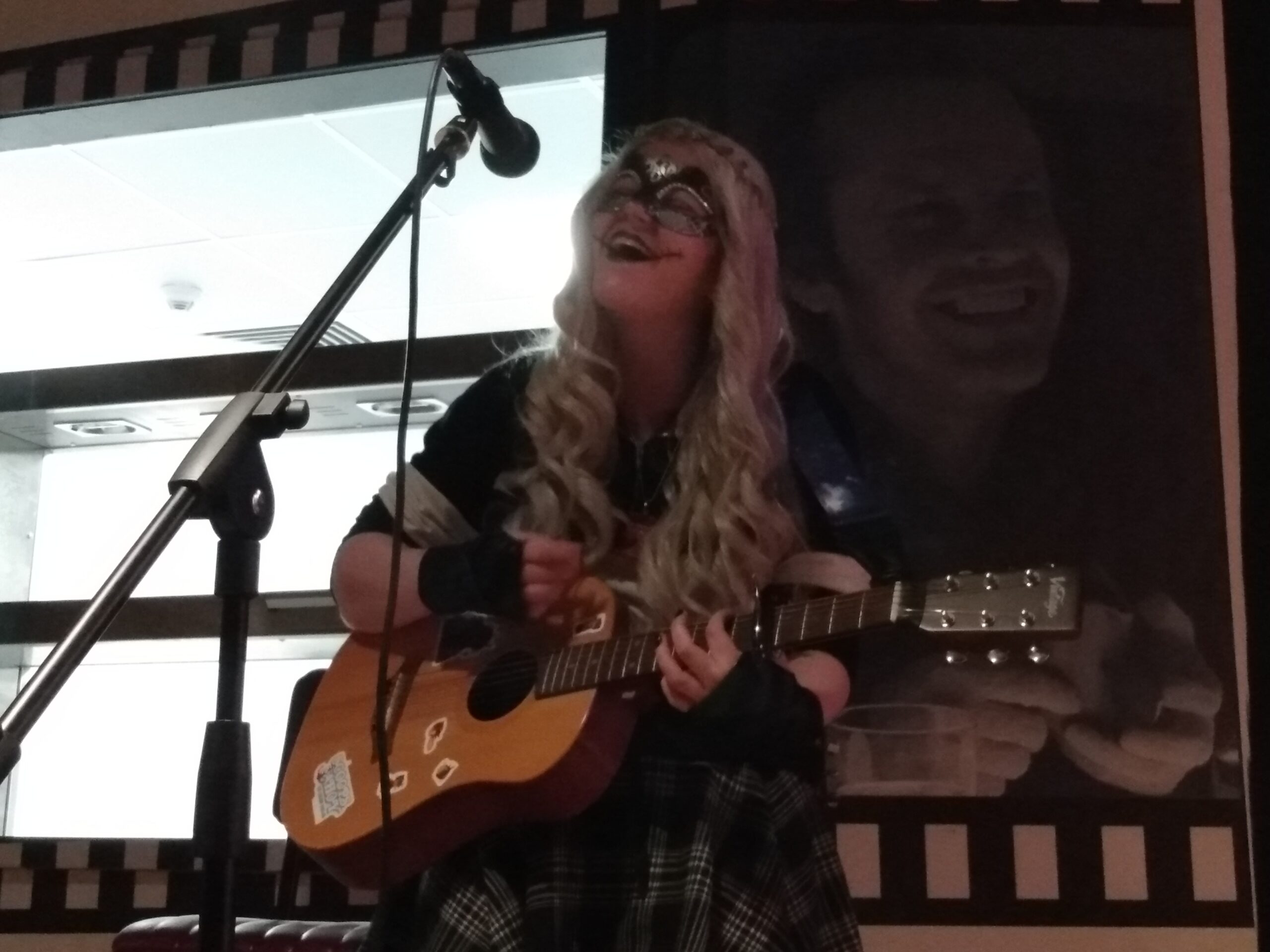Back in July, two members of the Angus Young Scot Media Group sat down with local young indie musician Nixomnia, shortly before her debut live performance.
Tirzah: Alright, so, you are Nixomnia, a local musician, so… We have some questions planned for you, starting with: Would you like to introduce yourself? What do you do? Stuff like that!
Okay, I’m Nixomnia, as you said, and I’m a kind of a self-made musician. I record and mix and distribute my music myself.
Tirzah: And you’re based out of Angus?
Yeah.
Tirzah: Duncan, the next question is over to you.
Duncan: Oh! S-Sorry.
Tirzah: You’re fine! This is an interview of amateurs, all just figuring it out as we go!
[laughs] Mhmm.
Duncan: [laughs] Thank you. Hi, um, I’m D-Duncan, I’m a peer of- I want to say colleague? To make it professional.
Tirzah: “Colleague” is a good word.
Duncan: [laughs] Thank you, colleague. Um, so, uh, w-w-why did you agree to an-an-an-an interview with us?
Mainly because I think it would be good for other, like, young adults and young people to see that there’s creative people in the area because I know when I was growing up here, I never really saw anything and it was kinda, like, Angus is just… Nobody gets anywhere from Angus! And, so, um, it would help encourage others, to see that there are people here who are doing things, y’know? Also, it’s handy for me as well, ‘cause it kinda spreads word about me a bit.
Duncan: C-Cool.
Tirzah: Sorry to ask this before talking about any of your music but this is an interview with the Angus YoungScot Media Team, so… Do you have your YoungScot card? Any experiences with YoungScot to share?
I do have a YoungScot card! Mainly at the moment, I just use it for free bus travel. [laughs] But I used it a bit before for discounts in certain shops and just, kind of, it’s my main… um, uh, what’s it called? …ID! That I use.
Duncan: Okay, um, right, o-o-okay, and now what we’re actually here to talk about – w-we’ve gotten the YoungScot plug ou-ou-ou-ou-out the way, we’ll not- we’ll not- we’ll not get shouted out now-
Tirzah: [laughs] That’s going to be in the transcript!
Duncan: [laughs] Let- Let ‘em fight me!
[laughs]
Duncan: Te-e-ell us about your music! What, um, genres do you l- do you-ou- do you like doing? And how do you decide on what genres to try?
I mainly play and write the type of genres that I like listening to, ‘cause I like listening to, uh, my own stuff and I’m mainly into, like, Indie Rock and Indie Pop stuff but I don’t really know if I would have a specific genre that I stick to ‘cause it’s just kinda, like, I write and then it becomes whatever it is. So, yeah, I’d say that how I decide is just whatever feels right.
Duncan: Fair enough. So it’s- So it’s li-like a-a process, of sorts?
Yeah!
Duncan: Aw-Awe-Awesome.
Tirzah: So, how did you get your start in music?
I mean, I’ve been playing instruments since around about… I was three years old, I think, when I- the first, I think, it was probably Baa Baa Black Sheep or something on a little toy piano. And then I just kind of continued through school and I had piano lessons and then I… I kind of wrote a little bit here and there but it wasn’t anything that I was super proud of and then, I think it was around twenty nineteen when I started just, I… I don’t remember why I decided to but I just wrote my first song and then I realised that I actually quite enjoy it, so I started writing from there and improved over time and then, when lockdown hit, I just decided, y’know, I might as well put it out there because I’ve not got anything else to do. So. Mhm.
Tirzah: Since you brought up lockdown, to jump ahead in our questions a little bit – sorry Duncan, I know it was your turn! – you released your first song, a cover of Mr Brightside in August of 2020 and then your first original release was in the December of the same year, so we were wondering, what was it like having your musical debut in the middle of a pandemic?
It was quite relieving in a way because there was no stress about trying to do it on top of other things ‘cause, uh, I- I just- we were all stuck at home and I had literally nothing else to do. And, also, a lot of what had held me back before was peer opinions, um, I didn’t get on well with people at school and so I was always worried that if I ever did post anything, it would just end up being used against me, whereas, when we were in a pandemic, I wasn’t seeing anyone, so, it was like I had a bit of freedom.
Tirzah: [nodding] So, um, getting back to the planned order of our questions-
[laughs]
Tirzah: Do you want this one Duncan?
Duncan: Sure. Um, w-what made you d-decide to use a stage name?
A little bit of what I said about how I was afraid of peer opinions and so this way it was like they wouldn’t be able to find me? Because it wouldn’t be under my name. And also just kind of, I… I wanted to keep it a bit separate from the rest of my- my actual career that I’m going into and so this way it meant that it wasn’t a job, it was still a hobby and so I didn’t have too much, like, pressure about getting stuff out consistently because I’m very not consistent. So, yeah, it’s just kind of to keep it a bit separate from my… life, I guess. ‘Cause it’s like… not… not fully me, if that makes sense? So then even if people are like “come on, release more music” it’s- it’s not me that they’re saying it to?
Duncan: Th-that’s really cool.
Thank you.
Tirzah: The next question was yours as well, Duncan, because we skipped ahead to one of mine!
Duncan: Oh! Right, oh no, here. Y-you’re getting an odd question now-
[laughs]
Duncan: Why the di- Why use the di-i-i-istribution me-ethods that you’ve chosen?
I use Distrokid mainly ‘cause it’s- it’s really handy, like, it’s hassle free, so I just kind of upload my songs there and then tick all the boxes where I want it to be sent and then they put it out for me and so it means I don’t have to do much of the business-y stuff, which is not my strong suite. And also it was popular and I’d heard of it before so it meant it was more likely to be legit? And, also, it lets me keep a hundred percent of the revenue and so I pay a one-time fee every year and then I can release as many songs as I like, whereas some of the other ones I looked at was you pay a certain fee with every song. So it means I’ve got all the rights to my own music which was what I wanted.
Tirzah: And now we’re back to me! Another technical kind of question, what tech specs do you use when you’re making your music? Are there any tech hurdles you’ve had to overcome? Such as with recording, for example?
I use a free online service called Soundtrap and then I also use Wondershare Filmora for making things like music videos and I- I also use, like, a condenser mic and then a ZEDi-10FX mixer – which I had to write down because I couldn’t remember the name of it – which I am still figuring out, I’ve had it for, like, seven months now and I’m still not sure how all of it works. Yeah, that would be something ‘cause I did a bit of music tech in school but I… don’t understand all of it and I- I don’t have anywhere to ask for help and so it’s definitely something that’s a bit difficult and the- I’ve tried so many different mixing softwares and it’s so confusing and I cannot figure half the stuff out ‘cause there’s so much at once, so, when I- I think I was, like, in S3 or something when I used Soundtrap for the first time and it’s so simple and it’s colour-coded and so I just [laughs] still use it, um-
Tirzah: Colour-coding is the most valuable of features!
Exactly! It’s just a lot easier to use, yeah.
Duncan: Oh, is it me again? Oh sh-shoot, I-I-I’ll get the hang of this eventually!
Tirzah: [laughs]
[laughs] Yeah!
Duncan: So, foll-ollowing on from-from-from-from-from-from these questions is-is there any advice that y-you would like to offer to o-other young pe-e-eople who-who-who want to get in t-to the music industry f-from Angus?
I’d say, kind of, like, be free with it? Do it the way you want to do it and don’t let the fear of what other people will say hold you back, ‘cause it- it shouldn’t. And I- I know that it held me back for ages and I wish I had just gone for it. Also don’t think it’s hopeless? ‘Cause, there- there’s such a big industry in Scotland for the Creative Arts and it doesn’t matter where you’ve come from when you are getting there, y’know? It’s never taken into account; like, people won’t think “oh you’re from there, I’m not gonna listen to that”! I think definitely the main thing is just don’t let what other people say matter, it just is yours.
Tirzah: On the topic of the music being yours, while you’re here, are there any particular songs of yours you’d like to talk about?
I’ve got two that I think would be good to mention. One is already released and then one is an upcoming one. The already released one is Don’t Leave Me Behind which I kind of wrote for other people, mainly. Because it’s a song written about a really hard time for me, where one of my friends was in quite bad condition and stuff and so I… I just kind of wrote it to get it off of my mind and I think it could be really helpful for other young people because, like, in Scotland we’ve got such a bad mental health crisis at the moment and I think anything can help and I hope that that would be able to help. And the other one is a song called Manufactured Girl, which is my next one to be released. And that’s kind of written about the whole, um, what’s the word… like, the whole status that women have to keep up and the way we have to be in order to be successful and how much harder it is than, I think, a lot of people realise. So, that’s kinda written about, just, how we have to be all dolled up all the time and literally manufactured. And it’s not, like, a largely serious song, it’s quite a good dance beat, I guess, but yeah, I’m really proud of that one because it’s something that I’m really passionate about and so I’m hoping it’ll resonate with some people.
Tirzah: Back to you for the final question, Duncan?
Duncan: Oh, yeah, very well. So, to-to-to finish off, so, we’ve t-talked about songs th-that you’ve- th-that you’ve r-released, so to finish off, have you got any up-upcoming stuff that you would like to h-h-hy-hy-hype up at all?
Yeah, so, obviously Manufactured Girl, I just mentioned, that’s the next single to be released, and then I’ve got an album coming after that! It’s meant to be a Summer album, not sure if it’ll be Summer but it’s a Summer vibe. So that’s hopefully sometime soon. And I’ve got an upcoming gig at the Montrose Playhouse on… this Thursday, the twenty-eighth, I think it is? So, that, I’m quite excited about that!
Tirzah: We’ll need to make sure we get this interview up by Thursday, then!
EDITOR’S NOTE: We did not get the article finished by Thursday the 28th of July but we did get some excellent photos from the show!




You can find Nixomnia’s music here on Spotify, including Manufactured Girl, which is out now!
https://open.spotify.com/artist/6pMRbx9q0aEijGqmdZt6P8
A note from Duncan
The reason my dialogue is transcribed this way is to represent my speech impediment, which is known as a stammer. As part of the group’s Disabilities and Difficulties campaign, we wanted to highlight how some members of the group live and struggle with neurological and physical impediments which impact our day-to-day wellbeing. This is the same for many working in the media industry. I personally also decided to include my stammer in the transcription as I had never seen it done before and believed it would be a fantastic opportunity to raise awareness.
